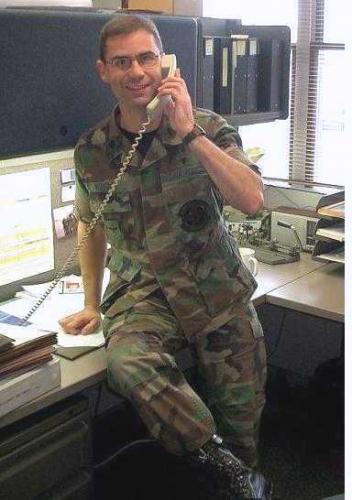
Tell me about your current role at Yale University.
I am the Evening and Weekend Manager of Access Services at the Center for Science and Social Science Information (CSSSI) which is located in the Kline Biology Tower. I am ready to help lead and support with anything that is needed to keep the day-to-day operations running smoothly. This includes assisting with staffing, training, workflow, and improving the traditional and more contemporary technology services we provide to our patrons.
Would you share some of your military experience and transition to the private sector?
I served over 24 years as a Medical Service Corps officer, including over ten years on active duty… almost eleven years in the Army, followed by over thirteen years in the Air Force. Some of my more exciting assignments included working for the Army Surgeon General doing top-level professional medical recruitment, teaching and training as an Army ROTC instructor, and running a community-based Air Force hospital. During my last nine years I worked in tactical aeromedical evacuation operations—which is battlefield patient evacuation. I retired as a Lieutenant Colonel in 2004. The transition to the private sector was facilitated by my work as an Ombudsman for the Employer Support of the Guard and Reserve Program (ESGR). I mediated many cases between employers and military members, helping everyone to understand the roles, responsibilities, and rights of service members and their employers. Constantly working on both sides of the fence eased the complete move to the private sector.
How does your military experience impact your position at Yale?
My military experience gave me extensive professional leadership training and experience at a young age. This training covered tangible skills, but also taught me how to approach a problem and see it through to completion, often with very limited resources. It taught me to lead, not just manage or supervise.
My experience in healthcare management can be directly applied to the work I do at CSSSI. They both involve customer service, records management, various forms and file administration, retrieving and organizing data, managing workflow, working with staffing, and maintaining continuous process improvement. Most importantly the “people skills” I developed in the military afford me an advantage in providing exceptional service support to all of our library patrons and to my colleagues.
Could you discuss some of the intangible skills that veterans like yourself bring to an organization?
Military veterans find ways to accomplish goals using limited resources. We have a “can-do” attitude, and find ways to follow through with our responsibilities in the face of all odds. We quickly develop time-management and leadership skills and how to deal with stress in all conditions. A huge part of military service—and a part that is often overlooked—is people skills. We work with many different types of people and personalities, including members of the international community. We accept people and meet them where they are. We practice service before self, strive for excellence in everything we do, and hold to a code of integrity that was instilled in us from the moment we took our first oath of office.
What do you think about the Yale Veterans Network?
The Yale Veterans Network is long overdue, and I am pleased to see its presence at Yale growing. It is a very special kind of Affinity Group because the uniting characteristic of most members cannot be seen. For those who served in the military, one must come forward and “claim” that veteran status. Although it is something we should all be proud of, some of our Yale veterans share a fear of revealing their military background. There may be valid reasons for that, but we are at a turning point in Yale’s history where self-identification and the resulting growth of the group could generate huge steps towards the proper representation, understanding, and protection of veterans in the private sector. This movement of public support is huge because of the experience, work ethic, and service that veterans can contribute to the work force can pay huge dividends to Yale and other employers. The more support we receive, the more we are able to contribute.